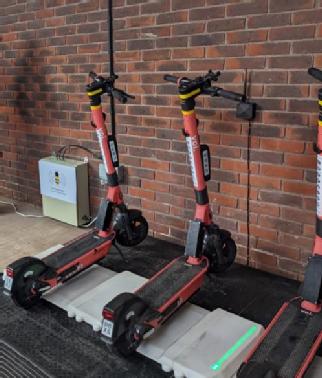WMG News - Latest news from WMG
Voi and Bumblebee Power partner on UK’s first wireless e-scooter charging trial launched at the University of Warwick
- Time-consuming and resource-intensive charging processes could be replaced by wireless charging for e-scooter rental fleets
- The ease of use for consumers and a reduction in operating costs through wider adoption of this technology would be a big advantage for the UK’s biggest rental scheme operator, Voi
- Trial in partnership with Bumblebee Power and WMG on the University of Warwick campus allows real-world testing in a ‘mini-city’ environment
- A successful trial will pave the way for seamless and convenient charging of e-scooters
Voi Technology, the UK’s largest e-scooter rental operator, has partnered with Bumblebee Power and WMG to trial the use of Bumblebee’s wireless e-scooter charging at the University of Warwick campus over a 6-month period potentially changing the future of the micromobility industry.
As with the charging of electric cars, the charging of e-scooters is a challenge for the operators of extensive rental schemes. The batteries powering their zero-emissions e-scooters are currently charged safely at their warehouse; however, they are replaced when vehicles are either receiving their regular in-house inspections or by the company’s in-field team who visit each e-scooter to perform fresh battery swaps.
These processes can lead to high operating costs for their business as the processes can be both time-consuming and often resource-intensive by requiring additional warehouse infrastructure for safe battery charging as well as transportation costs. Therefore, Voi began exploring new charging methodologies as a result that could provide the same excellent user experience whilst also delivering a similar vehicle efficient and effective battery performance. The potential solution: wireless charging.
additional warehouse infrastructure for safe battery charging as well as transportation costs. Therefore, Voi began exploring new charging methodologies as a result that could provide the same excellent user experience whilst also delivering a similar vehicle efficient and effective battery performance. The potential solution: wireless charging.
In partnership with Bumblebee Power, the wireless charging pads make it possible to charge e-scooters where they are parked, reducing not only operational costs but make their integration into the street and transport infrastructure more streamlined, making the modal shift to a convenient and flexible mode of transport easier for new and existing riders.
The University of Warwick campus ‘mini-city’ environment has been selected for this trial and provides an excellent, safe test bed for testing transport innovations. Available to estate staff only, a busy environment with a large population of students, staff, and industrial partners means the University of Warwick is an ideal ‘living lab’ environment to enable sustainable research and development of this technology.
The trial will provide data on the wireless system performance as well as user behaviour and interaction with the technology, which is crucial to any future large-scale deployment. If the trial proves successful it could be expanded to cover more of the Voi fleet across the UK.
David Yates, CTO of Bumblebee Power explains:
“The Bumblebee patented technology, which originated from Imperial College London, provides automatic connection via a very efficient wireless charging system, saving operational expenditure for the fleet operator by eliminating battery swaps. In addition, it makes possible the ability to extend the battery’s life, by controlling the charging regime whilst maximising vehicle availability.”
Sam Pooke, Senior Policy Manager at Voi UK and Ireland, said:
“We’re delighted to be partnering with Bumblebee Power to develop wireless charging for our e-scooters, an innovation that could change the whole micromobility industry.
“Applying this technology has the potential to not only reduce the operational impact of how we charge batteries for our vehicles but also in making an already convenient and flexible service even more accessible for new and existing riders. Over the coming months, we’ll look forward to working with our partners to maximise the innovative potential of this technology.”
David Evans, Lead Engineer at WMG, University of Warwick, said:
“Wireless charging technology for micromobility has the potential to reduce operational costs for fleet operators and provide a convenient charging solution for users. The University of Warwick campus is an ideal location to trial transport innovations such as these, providing a real world, mini city environment with world class teaching and research facilities.”
